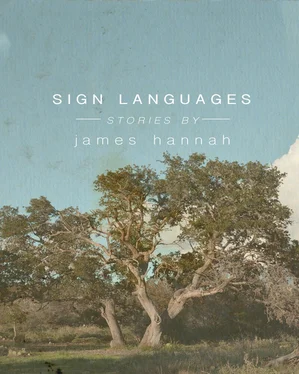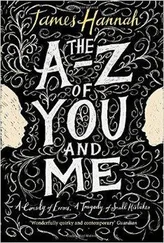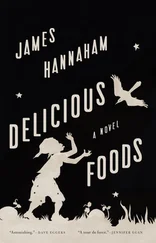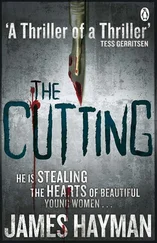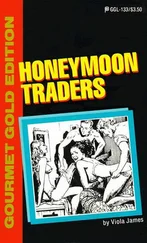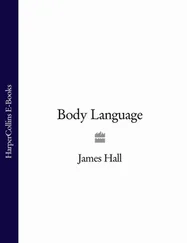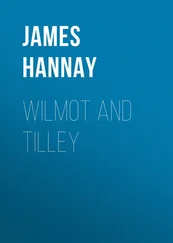James Hannah - Sign Languages
Здесь есть возможность читать онлайн «James Hannah - Sign Languages» весь текст электронной книги совершенно бесплатно (целиком полную версию без сокращений). В некоторых случаях можно слушать аудио, скачать через торрент в формате fb2 и присутствует краткое содержание. Год выпуска: 2015, Издательство: Dzanc Books, Жанр: Современная проза, на английском языке. Описание произведения, (предисловие) а так же отзывы посетителей доступны на портале библиотеки ЛибКат.
- Название:Sign Languages
- Автор:
- Издательство:Dzanc Books
- Жанр:
- Год:2015
- ISBN:нет данных
- Рейтинг книги:5 / 5. Голосов: 1
-
Избранное:Добавить в избранное
- Отзывы:
-
Ваша оценка:
- 100
- 1
- 2
- 3
- 4
- 5
Sign Languages: краткое содержание, описание и аннотация
Предлагаем к чтению аннотацию, описание, краткое содержание или предисловие (зависит от того, что написал сам автор книги «Sign Languages»). Если вы не нашли необходимую информацию о книге — напишите в комментариях, мы постараемся отыскать её.
Sign Languages — читать онлайн бесплатно полную книгу (весь текст) целиком
Ниже представлен текст книги, разбитый по страницам. Система сохранения места последней прочитанной страницы, позволяет с удобством читать онлайн бесплатно книгу «Sign Languages», без необходимости каждый раз заново искать на чём Вы остановились. Поставьте закладку, и сможете в любой момент перейти на страницу, на которой закончили чтение.
Интервал:
Закладка:
They continued to get their hooks deeper in me. Father Stephen’s hands clasped like plaster praying hands over the sheets of paper. Like the cupped hand I keep on the windowsill.
They drove me to a doctor in Brantley Cove. A small young black man. I almost said something when we were alone, but I saw his face in the mirror as he washed with green soap. Later his fingers barely touched me, gingerly along my throat and at my chest and shoulder blades. The shouts of nigger, whistling foaming full cans of Budweiser, Schlitz, which I finished off, everywhere around me. I always stand stock-still like the cows, surprised it’s come back to this again.
I don’t build a fire in the stove to fry the bacon they gave me that I keep in an old metal bicycle basket deep in the well. The wires icy to the touch. Instead I take some of her ribbon off the nails near the back door. Two yellow ones which bring with them a laugh of hers about something or other.
I tie them in my beard, let them dangle on my chest. The yarrow has begun to spread near the door; I try not to crush it as I get down on all fours and pull out the twisted shovel with the shattered handle. As I walk down the road that circles the house and goes down through the evergreens that block it from Farm Road 3941, I smell the jonquils. And I want to let Mothermae listen to my mind thank her God and Baby Jesus that it’s warm again and I’ve come out of the cold to see the road, to “glean it clean,” she’d say. Glean it. Glean a word I believe sprouted from black bottomland cotton fields. A word I love.
“No, I never worked. My legs never been right.” And we looked at one another until he smiled and nodded. “That’s all right. That’s all right.”
So I lied, Mothermae. Okay, you smiling, compassionate man, I walked into Hopkins when I was twelve and she cut across Mecham’s Prairie to Luxor to mend clothes in a converted garage. I could read. I sat for centuries in the dark filthy room. The old man droned on and on. Stomachs growled all day. We all itched lice. The dark, near the muddy floor, under the desks full of mosquitoes drinking constantly, raising purple welts. Spring thunderstorms melted the cardboard windowpanes. The damp curled paper.
Later I came with her past the windowless garage to the sawmill icehouse. In the awful August heat I loved the wet sawdust floor, the blocks of ice warped and irregular rising to the ceiling. The clunk of metal tongs, the shower of ice from their deep bites.
Nigger this, nigger that. The oldest, who ran the hand-cranked crusher, named Nigger Boss.
But soon there were troubles. The whites laid off and waiting for someone to cuss, to yell at from store porches and through screened doors.
No work for anybody. The cross-tie mill burned. We woke that night smelling it on the dry wind and walked down to the Farm Road — just dirt then, the scant gravel beat to the sides — to watch it. The sky free of town lights. It was wonderful and Mothermae shook her head and cried. Took my arm and trembled.
Somehow she worked on. She saved almost all of her money in a metal saltine tin.
I never went to see the destruction. Now there were shootings all over. Whites drunk and mad. Black folks trying to be absolutely quiet and still in Shady Bend, the nigger quarters down the hill from the icehouse.
No work. The last time I saw the icehouse, we walked through its empty dark caves, me and Boss. “I’ll be okay. You, too,” he said more than once.
And so I tried this and that. For a long time we drank whatever we could find. And some nights I’d stay in the quarters with someone from work.
Now at the ancient fence — a few rotten posts, the rusty wire sticking up from the pine needles like some red leafless vine — I turn away from where my road goes on to cross the bar ditch and connects with Farm Road 3941. Instead, using the shovel as a cane, I move slowly through the saplings so I’ll come out onto it a long ways from the house. My ribbons flutter in the slight breeze. I ease across a low spot and cross another abandoned road. I stop to breathe but I don’t sit down. That day I’d been on the road until after dark. I crawled up this slope and sat listening to them in the car. The windows were down. They rocked its stiff springs. She kept saying, “There, right there. No, right there.” But he didn’t seem to be getting it right. He shouted “Nancy,” and the woods came back with its sounds of frogs, an owl far away along Bridgett Creek.
They began again. Something I could never do. Only once and I melt away to sleep. The small house in the quarters full of people noises and the heavy odor of kerosene and boiled supper. She called it my dick. What I’d thought of as my thing, what Mothermae had called it when she washed me in the metal tub we’d gleaned from somewhere.
We fought and drank and sat on the porch. And everything else, I guess. Years ago. She’d drink the whiskey we got in Mason jars and at almost sunup she’d hit me with her fists as we lay on the bed. I’d jerk awake, the others beginning to get up. Coughs and the last deep snores from the soundest sleep. “Goddammit,” she’d shout, “I can’t even sleep. Why can’t I sleep, you bastard. Laying there snoring. Get out, goddammit. Go on home to ‘Mothermae I.’”
“Nothing turned up yet?” Mothermae’d ask. And I’d shrug and walk back into Luxor to drink and sleep with her. With Kay.
Until I couldn’t anymore. When they burned most of Shady Bend down. Black and white. And Kay just sat on the porch, drinking, and never let the jar touch the floor. Hugging it between her thighs.
I stepped over one of the white bastards outside of town. Someone had laid him out cold, a brick propped against his temple.
But I don’t count any of that. So maybe I didn’t lie to the first priest or later to Father Stephen and the thick heavy Jesus, now a grown man, on the wooden cross on his vast chest. “No, I’ve never had a job.” Besides, all that was before Social Security shit.
She still sewed. Up to the very end. And I complained about my back for years until one day I just stopped in the middle of the sentence because both of us were tired of hearing it.
People came to me over the road. I gleaned the road.
Like now, when I come up out of the ditch, deeper here than anywhere else except at the grate where it drops sharply into the creek. That’s tomorrow. I admit I’ve pushed it up a day. One day only. That’s bad enough. I won’t do it again. Never have before, that I can remember. I can’t begin to be haphazard now; I’ll miss something valuable.
Today the clouds are low. The gray light is warm. The asphalt is damp though there wasn’t rain last night. Along here once a car ran off the road and rolled through the fence — the posts, metal now, were spindly cedar then. I heard the whump of it all from the house.
No one was killed. Or even hurt. Back then the road was slow and the cars heavy and strong. I helped two white women up the bank and we talked for a long time until a delivery truck for a meat-packing plant stopped. We shook hands and waved. I heard the wrecker at the car the next day, but I didn’t go look. I already had a pair of earrings and leather gloves which I wet and stretched until they fit.
Today it’s a raccoon. Sometimes it’s a possum or a dog or tabby cat from somewhere far off. Or maybe they’re let out here by people tired of the trouble. Once I helped a man chase down a beautiful red bird-dog who’d escaped when he’d stopped to take a piss. He’d given me two dollars and a can of beer from a yellow cooler he had on the passenger’s side. He asked about something I had on my jacket or in my hair and I think I told him all about it. And he asked more and I saw he understood everything I said.
Читать дальшеИнтервал:
Закладка:
Похожие книги на «Sign Languages»
Представляем Вашему вниманию похожие книги на «Sign Languages» списком для выбора. Мы отобрали схожую по названию и смыслу литературу в надежде предоставить читателям больше вариантов отыскать новые, интересные, ещё непрочитанные произведения.
Обсуждение, отзывы о книге «Sign Languages» и просто собственные мнения читателей. Оставьте ваши комментарии, напишите, что Вы думаете о произведении, его смысле или главных героях. Укажите что конкретно понравилось, а что нет, и почему Вы так считаете.
